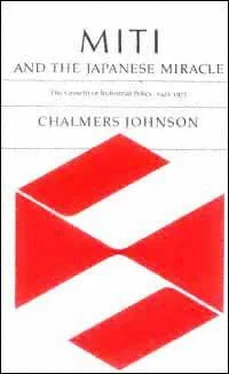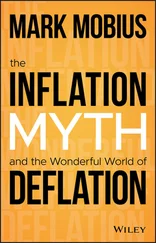ibid.
, Mar. 25, 1974; "MITI Role Questioned,"
ibid.
, Apr. 16, 1974; "MITI Says Oil Industry's Acts Com-
Page 363

pletely Lawful,"
ibid.
, Apr. 17, 1974; "Prosecutors Get Oil Price Report,"
ibid.
, May 8, 1974.

47. See
Nihon keizai shimbun, Asahi shimbun, Japan Times, Mainichi Daily News
, and
Wall Street Journal
, May 29, 1974. See also the
Asahi
series "Sekiyu karuteru" (Oil cartel), May 29 and 30, 1974; "Oil Companies Are Indicted"
Japan Economic Journal
, June 4, 1974; ''Letter from Tokyo,"
Far Eastern Economic Review
, June 3, 1974. On the progress and outcome of the case, see Kakuma, 1979b, pp. 15470, 17889;
Japan Economic Journal
, Oct. 21, 1980, editorial;
Japan Times Weekly
, Feb. 14, 1981.

48. "Antimonopoly Law,"
Japan Times
, May 30, 1974; "MITI-FTC Dispute,"
Mainichi Daily News
, June 29, 1974.

49. See Chalmers Johnson, "Japan: The Year of 'Money-Power' Politics,"
Asian Survey
, 15 (Jan. 1975): 2534; and Chalmers Johnson, "Japan 1975: Mr. Clean Muddles Through,"
Asian Survey
, 16 (Jan. 1976): 3141.

50. For a chronology of the AML revision, see Komatsu, p. 174; for Shiina's killing of the AML revision bill in 1975, see Nawa, 1976a, p. 94. See also "FTC Head Takahashi Quits,"
Japan Times
, Feb. 6, 1976.

51. See Morozumi.

52. MITI, 1974, 268 pp. The 1975 updating, of some 398 pp., was published on Aug. 20, 1975. JETRO also brought out a translation of the first "vision plan" under the title
Japan's Industrial Structure: A Long Range Vision
(Tokyo: JETRO, 1975), as well as an English supplement to the 1975 version.

53.
News from MITI
, no. 7934 (Dec. 20, 1979);
Look Japan
, Jan. 10, 1980.

54. See Saxonhouse.
Nine

1. Sam Jameson and John F. Lawrence, "U.S. Problem Not Labor but ManagersSony Chief,"
Los Angeles Times
, Oct. 29, 1980.

2. "Firms Go Wild on Expenses; Japan's Taxmen Indulgent,"
San Francisco Examiner
, Jan. 6, 1981.

3. For an excellent critique of the bureaucratic-authoritarian model, see David Collier, ed.,
The New Authoritarianism in Latin America
(Princeton, N.J.: Princeton University Press, 1979).

4. For details, see Ellen Comisso,
Workers' Control Under Plan and Market: Implications of Yugoslav Self-Management
(New Haven, Conn.: Yale University Press, 1979).

5. "Political Struggles in Bureaucratic Societies,"
World Politics
, 9 (Oct. 1956): 2036.

6. Drucker, p. 53.
Page 367
Bibliography
If an individual author has two or more items listed under his name, they are arranged chronologically according to date of publication.

Abegglen, James C. "The Economic Growth of Japan."
Scientific American
, 222 (Mar. 1970): 3137.

, and Rapp, William V. "Japanese Managerial Behavior and 'Excessive Competition.'"
The Developing Economies
, 8 (Dec. 1970): 42744.

et al.
U.S.-Japan Economic Relations
. Berkeley: University of California, Institute of East Asian Studies, 1980.

Abe Yasuji.
Ichimada Naoto den
(A biography of Ichimada Naoto). Tokyo: Toyo * Shokan, 1955.

Administrative Investigation Council (Gyosei* Chosa* Kai).
Kaku
kancho
*
kyoka ninka
jiko
*
no seiri ni kan suru
chosashu
* (Investigation report on the reduction of licenses and approvals by government agencies). Vol. 1, N.p., Jan. 21, 1926.

Akaboshi Jun (pseud. of Nawa Taro*).
Shosetsu
*
Tsusan-sho*
(MITI stories). Tokyo: Daiyamondo Sha, 1971.

Akimi Jiro*.
Tsusan
*
kanryo
*,
seisaku to sono jittai
(Trade and industry bureaucrats: policy and its reality). Tokyo: San'ichi Shobo*, 1956.

Akimoto Hideo.
Shosetsu Tsusan-sho
(MITI stories). Tokyo: Futami Shobo, 1975.

Aliber, R. Z. "Planning, Growth, and Competition in the Japanese Economy."
Asian Survey
, 3 (Dec. 1963): 596608.

Allinson, Gary D.
Japanese Urbanism: Industry and Politics in Kariya, 1872197
2. Berkeley: University of California Press, 1975.

Amaya Naohiro.
Hyoryu-suru
*
Nihon keizai, shin
sangyo
*
seisaku no bijon
. (The Japanese economy adrift: a vision of the new industrial policy). Tokyo: Mainichi Shimbun Sha, 1975.

Anderson, Irvine H., Jr.
The Standard-Vacuum Oil Company and United States East Asian Policy, 1933194
1. Princeton, N.J.: Princeton University Press, 1975.

Aoki Kazuaki. "Tsusan-sho* no shohisha* shiko* wa honmono ka" (Is there any substance to MITI's commitment to consumers?).
Читать дальше













